Undergraduate Research News
Array of research topics, high turnout mark 2025 Research Symposium, as nearly 70 projects receive awards for studies on cancer, social media, robotics and more
With projects focused on cancer treatments, social media influence, robotics innovations and more, the 2025 Auburn Research Symposium spotlighted the research and creative scholarship of nearly 500 graduate and undergraduate students from Auburn University and Auburn University at Montgomery. The symposium was held March 26 at the Melton Student Center, and 69 award-winning presenters were honored during an April 2 ceremony.
For the second year running, postdoctoral researchers participated in non-competitive presentations, as well as in newly added round-table discussions. Turnout was high for the annual event, with a near 10% increase in the number of presenters.
“It was a genuine pleasure to witness the outstanding presentations at this year’s symposium,” said Lorenzo Cremaschi, symposium organizing committee chair and director of undergraduate research. “All our students and postdoctoral researchers did an exceptional job in showcasing their research and emphasizing its impact. I extend my heartfelt thanks to all the participants who presented, judged and organized the symposium, and I offer my sincerest congratulations to the award recipients for their remarkable achievements.”
Cremaschi noted, “This event not only serves as an excellent platform to share the remarkable research conducted at Auburn but also fosters collaboration and networking both within and beyond the university. Connecting with peers, sharing ideas and building partnerships can lead to groundbreaking discoveries and innovations that benefit both the academic community and society at large.”
Undergraduate research awards
The undergraduate first-place award in the Science, Technology, Engineering and Mathematics poster presentations went to Nathan Newman of the Department of Pathobiology in the College of Veterinary Medicine, who won the same award the previous year. Matthew Hughes, from the Department of Poultry Science in the College of Agriculture, received first place in the STEM oral presentations.
In the category for Human Sciences, Social Sciences, Creative Arts, Nursing and Humanities, Toni Lee of the Department of Sociology, Anthropology and Social Work in the College of Liberal Arts won first place in the poster division, and Leticia Raymundi Pinheiro of the College of Nursing took first in the oral presentations.
Graduate research awards
The graduate student first-place winner for the Science, Technology, Engineering and Mathematics poster presentations was Mana Okudaira of the Department of Clinical Sciences in the College of Veterinary Medicine. The winner of the first-place award in the STEM oral presentations was Jaden King of the College of Forestry, Wildlife and Environment.
In the category for Human Sciences, Social Sciences, Creative Arts, Nursing and Humanities, Zeynep Su Altinoz of the Department of Human Development and Family Science (HDFS) in the College of Human Sciences won first place in the poster presentations. Emma Chandler, also of HDFS, received first-place recognition in the oral presentations.

Categories: Undergraduate Research, Creative Scholarship, Graduate Student Research
Abstract submission for 2025 Auburn Research Symposium now open
Abstract submission for the 2025 Auburn Research Symposium is now open and will close on Feb. 10, 2025. Undergraduate students, graduate students and post-doctoral researchers in a multitude of disciplines are invited to participate through oral presentations, posters and creative scholarship displays.
The event will be held Wednesday, March 26, in the Auburn University Melton Student Center. Registration details, abstract guidelines and presentation award criteria are posted on the Research Symposium website.

Categories: Undergraduate Research, Creative Scholarship, Graduate Student Research
Urban Studio students present at international conference
The International Making Cities Livable Conference (IMCL) is a beacon for professionals, scholars and activists dedicated to creating healthier, inclusive and more sustainable cities.
For this year’s conference, an abstract summarizing the 2024 fifth-year Urban Studio students’ work on the Birmingham Parking Study was accepted for presentation. The conference took place during the weekend of April 28, and the students delivered a summary of both the parking study and how their individual thesis work expanded on aspects of the study.
What is the International Making Cities Livable Conference?
Founded on the principle that urban environments should enhance the quality of life, the International Making Cities Livable Conference has evolved into a crucial junction for exchanging groundbreaking ideas in urban planning, architecture, and community development. This conference brings together an array of professionals, including urban planners, architects, city officials and academics, to discuss challenges and explore solutions aimed at making cities more livable. The core of the conference revolves around themes such as sustainable urban design, social inclusivity and the psychological impact of urban living.
Why It’s Special for Students to Present Their Research Here
The acceptance of a student group to present at the 2024 IMCL Conference is significant. Typically dominated by seasoned professionals and academics, the inclusion of students highlights a refreshing shift towards recognizing and valuing fresh perspectives and innovative ideas.
For students, presenting at such a prestigious event provides exposure to industry leaders and an opportunity to contribute to meaningful discourse on urban livability. It’s a chance to test their ideas in a different academic arena and to network with potential mentors and collaborators who can help propel their careers forward.
This was the first time Urban Studio Director Alex Krumdieck ‘86 submitted students’ work for presentation at a conference. Since IMCL rarely features student work, he was unsure if the abstract would be accepted. Once he received notice, the next hurdle was to make sure the students were ready. For this, Krumdieck engaged a presentation coach to help them prepare.
In addition to working at their internships, preparing for their thesis presentations, and gearing up for graduation, the students dove into their presentation preparation. For the six weeks prior, they worked with their presentation coach on how to best organize their work into a cohesive and compelling story geared toward the audience at IMCL.
Conferences can be an important part of a student’s educational experience. As Krumdieck explained, “These kinds of opportunities teach students how to clearly convey their research to an audience and they learn how to showcase their work. Our students were able to take their research and distill it into a clear vision that resonated with the IMCL audience.”
In fact, Steve Mouzon, Principal at Miami’s Studio Sky & New Urban Guild, tweeted from the audience:
“Taking in the Auburn architecture students’ presentation of walkability (and lack of such) in Birmingham at #IMCLspring24 and the approach they’re taking bodes well for both their futures and that of the program. Starting with urbanism first & what makes it stronger. Well done!”
This year’s conference provided insight and inspiration, and a good number of the other presentations touched on the Urban Studio students’ topics. This reinforced the value of their CADC and Urban Studio education as not only theoretical but as real-world work. As these students presented their research, they learned that they were not just contributing to a conference—they were getting to see how what they had been learning was shaping the future of urban living.
Congratulations on a job well done Adrian Steward, Camille Lewellyn, Jeremy Daniel, Jack McMullen and Jimmy Ramsey!

Jack McMullen
Categories: Undergraduate Research
Undergraduate Research Fellowship Program application period open through Feb. 15, 2024
The 2024-2025 Undergraduate Research Fellowship application submission period opened Dec 1, 2023 and closes Feb 15, 2024.
Students can select from year-long, two-semester, one-semester and summer fellowships. The starting semester can be Summer 2024, or Fall 2024 or Spring 2025. The fellowship award period can be up to May 9, 2025.
For more information visit the Undergraduate Research Fellowship program webpage.
Categories: Undergraduate Research
Professor of veterinary anatomy honored with undergraduate research mentoring award
Ask Satyanarayana Pondugula what is the most important ingredient in good mentorship of undergraduate research and two words stand out in his reply: “real life.”
“I teach research topics in a real-life-oriented way to undergraduate researchers,” he said, when asked about his recent selection as recipient of the Auburn University Provost Award for Faculty Excellence in Undergraduate Research Mentoring. Established in 2012, the award recognizes faculty who demonstrate a strong commitment to undergraduate research and outstanding services to students, and whose efforts support Auburn students interested in careers in research and creative work.
“I believe the real-life application of research fosters critical thinking, encourages active learning and problem-solving strategies and cultivates the acquisition of life-long learning skills," said Pondugula, a professor in the Department of Anatomy, Physiology and Pharmacology in Auburn's College of Veterinary Medicine. "In my experience, undergraduate researchers are always motivated when I explicitly provide implications of their research work and how the outcomes of their research contributions help solve real-life issues.”
That strategy has helped Pondugula — who joined the Auburn faculty in 2011 after completing his postdoctoral work in pharmacology at St. Jude’s Children’s Research Hospital — develop a well-balanced undergraduate research program in the College of Veterinary Medicine. His undergraduate mentees have included students majoring in a wide range of fields, including biomedical sciences, chemistry, biochemistry, cellular and molecular biology and microbiology.
To date, Pondugula has mentored 34 students who have investigated drug discovery, metabolism and safety and published 19 journal articles and six book chapters. Several of his students have also been speakers at national and even international conferences. Their high output is reflective of his distinctive mentoring philosophy.
“I am dedicated to ensuring my undergraduate mentees are confident in presenting their research,” he explained. “I encourage their memberships in both local and national scientific organizations. Recognizing the lasting impact of first presentation experiences, I focus on nurturing their presentation skills and self-assurance. These interactions empower my undergraduates to enhance their content and sharpen their presentation skills.”
Just as important to Pondugula is mentoring students in the steps necessary to getting their research published. “A mentor should motivate the undergraduate mentees to publish their research findings in peer-reviewed journals,” he noted. “I guide my students to publish their research in the Auburn University Journal of Undergraduate Scholarship, a peer-reviewed journal highlighting the research of Auburn undergraduates. Learning to write, seek feedback and revise manuscripts for the local journal has proven beneficial in helping them later produce well-written manuscripts for publication in international peer-reviewed journals.”
Pondugula is excited to have his mentorship efforts recognized through the Auburn award, but is quick to deflect the real credit to his students and his own mentors. “I am grateful for this award,” he said, “which acknowledges the hard work, dedication, contributions and accomplishments of my students as well as the support of my college, department and colleagues across Auburn University.
“During my own academic journey, several professors mentored me and instilled me with a passion for teaching, research and mentorship,” he concluded. “Today, I am dedicated to providing similar support to my students while cultivating a research environment that nurtures their growth.”
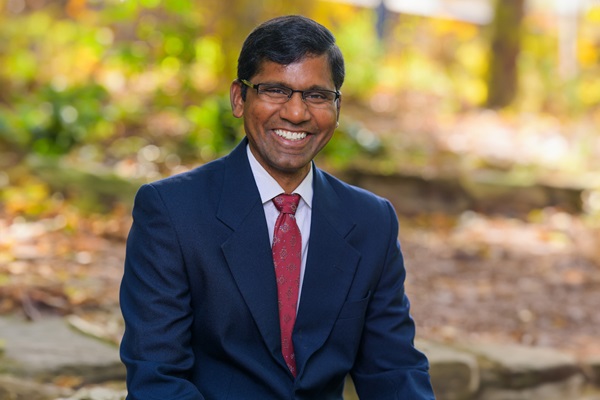
Satyanarayana Pondugula
Categories: Undergraduate Research
Abstract submission now open for the 2024 Auburn Research Symposium
Abstract submission for the 2024 Auburn Research Symposium is now open and will close on Feb. 11, 2024. Undergraduate and graduate students are invited to participate through oral presentations, posters and creative scholarship displays. Postdoctoral researchers are also invited to participate through oral presentations featured during the symposium.
The event will be held on Tuesday, March 26, in the Auburn University Melton Student Center. Registration details, abstract guidelines and best presentations award criteria are posted on the Research Symposium website.
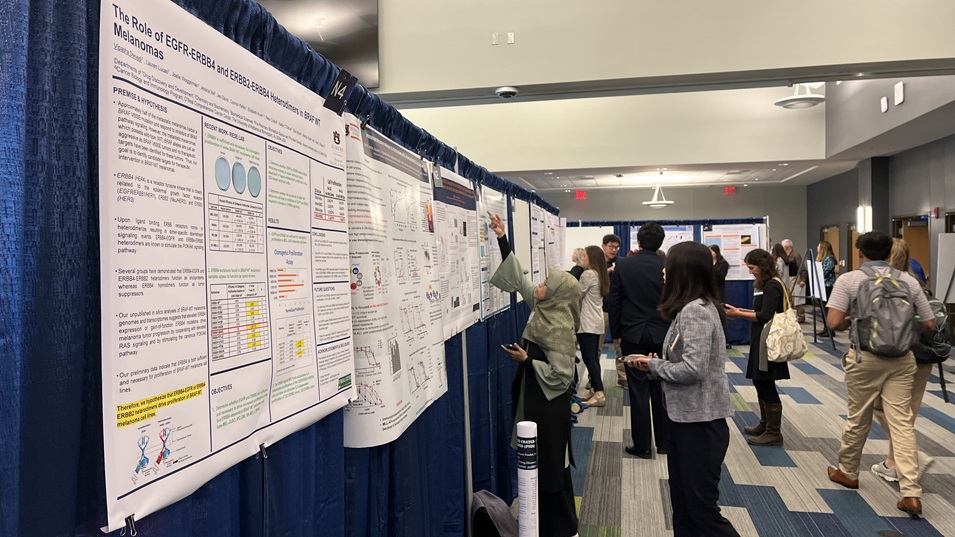
Categories: Undergraduate Research, Creative Scholarship, Graduate Student Research
Faculty Showcase for Undergraduate Research Opportunities to be held Oct. 17
The Faculty Showcase for Undergraduate Research Opportunities will be held Tuesday, Oct. 17, from 10 a.m. to 3 p.m. in the Brown-Kopel Engineering Student Achievement Center Grand Hall. The Showcase aims to connect faculty with students who want to engage in undergraduate research. Faculty will showcase their research with a poster presentation and explore potential opportunities for undergraduate research. Interested students can visit and interact on-site with faculty, post-docs or graduate students. Over 70 faculty across the campus will present at this Showcase. Interested students should pre-register. The Showcase preliminary program and student registration can be found on this webpage: https://our.auburn.edu/5836-2/
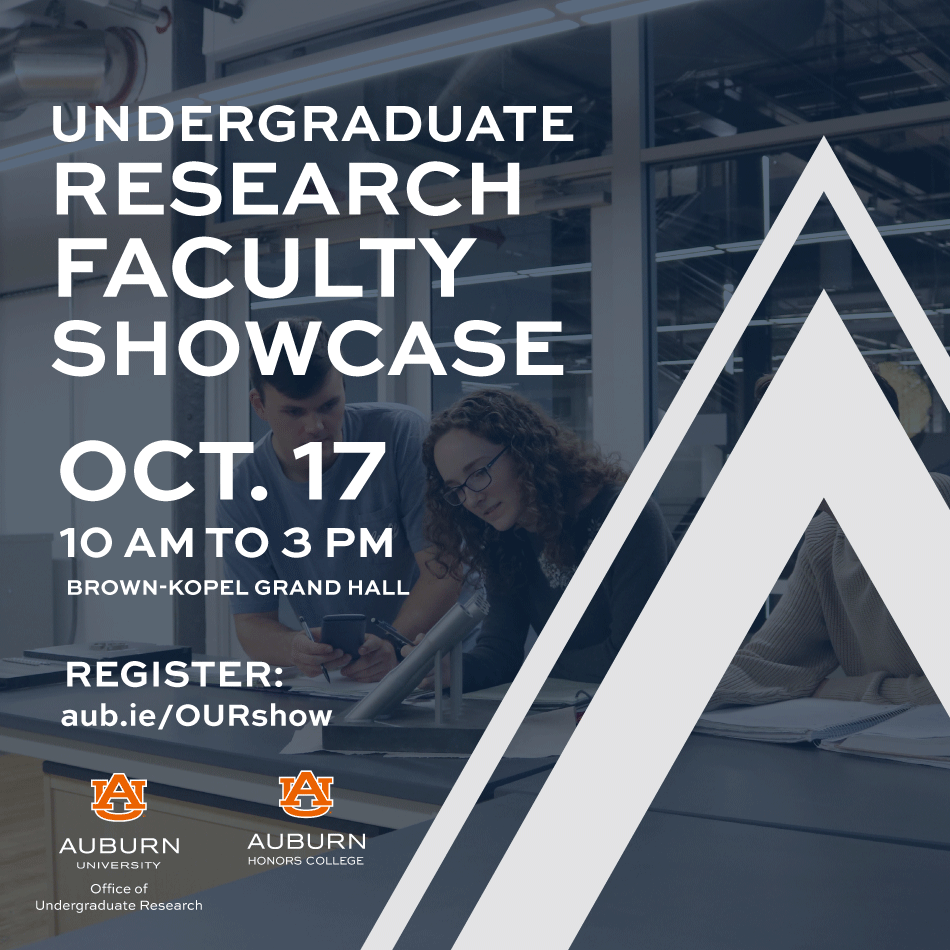
Categories: Undergraduate Research, OSVPRED
Student research symposium posters viewable on RBD Library digital wall
Posters from the 2023 Auburn Research Student Symposium are currently displayed on the digital wall in the Innovation and Research Commons of the Ralph Brown Draughon Library. The symposium is an annual spring event that shares student research and creative scholarship with a broad audience consisting of faculty, staff, graduate and undergraduate students and the public.
The Digital Wall is located on the first floor of the Ralph Brown Draughon Library and is available for viewing during all regular library hours.
More information about the Auburn Research Student Symposium. More information about the Digital Wall.
Categories: Undergraduate Research, Creative Scholarship, Graduate Student Research
Sixty-four students win awards at ‘Auburn Research: Student Symposium’
Sixty-four students took home awards for their research and creative scholarship posters and oral presentations during the recent “Auburn Research: Student Symposium.” Nearly 440 undergraduate and graduate students from Auburn University’s main campus and Auburn University at Montgomery participated in the annual symposium, which gives students an opportunity to share their work university-wide and with the general public.
“Congratulations to the award winners and to all of the students who participated,” said Lorenzo Cremaschi, director of undergraduate research. “Everyone did an outstanding job presenting their remarkable projects. Auburn has a wealth of talented student researchers.”
Undergraduate research awards
The undergraduate first-place award in the Science, Technology, Engineering and Mathematics poster presentations went to Alicia Taylor of Chemistry and Biochemistry. Catherine Walls of Poultry Science captured first place in the STEM oral presentations.
In the category for Human Sciences, Social Sciences, Creative Arts, Nursing and Humanities, Haley Shufflebarger of Interior Design won first place for her poster presentation, while Jordan Windham of Political Science took first in the oral presentations.
Graduate research awards
The graduate student first-place winner for the Science, Technology, Engineering and Mathematics poster presentations was Arthur Lamounier Moura of Forestry and Wildlife Sciences, while first place in the STEM oral presentations went to Claudia Rutland of Crop, Soil and Environmental Sciences.
In the category for Human Sciences, Social Sciences, Creative Arts, Nursing and Humanities, Sydney Waitz-Kulda of Psychology won first place in the poster presentations, while Priyadarshni Patel of Nutrition, Dietetics and Hospitality Management captured first in the oral presentations.
College-specific awards were also presented for undergraduate and graduate student categories. A complete list of winners, as well as titles of their projects, is available on the “Auburn Research: Student Symposium” website.
The Ralph Brown Draughon Library also plans an exhibit showcasing many of the winning posters. Details will be announced later about the exhibit.
BY CHARLES MARTIN
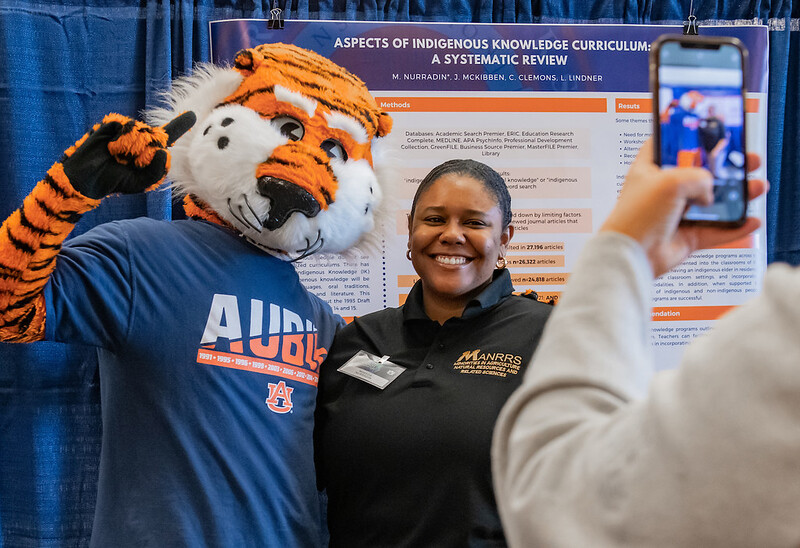
Aubie visits with Auburn student Makeda Nurradin of Curriculum and Teaching, who won third place in the graduate student poster presentations in the category, Human Sciences, Social Sciences, Creative Arts, Nursing and Humanities. Sixty-four students took home awards on the university and college levels.
Categories: Undergraduate Research, Creative Scholarship, Graduate Student Research
Cremaschi named Auburn University’s director of undergraduate research
Lorenzo Cremaschi, a professor in Auburn University’s Department of Mechanical Engineering, has been named the university’s director of undergraduate research. He started the new role Jan. 1.
In this role, Cremaschi oversees the Office of Undergraduate Research, which promotes research and creative scholarship among undergraduate students across all disciplines. As director, he also provides guidance for the Undergraduate Research Fellowship Program and the Auburn University Journal of Undergraduate Studies, in addition to providing leadership for the annual Auburn Research: Student Symposium.
“Dr. Cremaschi brings a wealth of knowledge and experience to the role of director of undergraduate research,” said James Weyhenmeyer, vice president for research and economic development. “We are delighted to have him on board to provide leadership for our undergraduate research programs, which are a vital part of the university’s success as a top-tier research institution.”
Cremaschi has mentored 22 undergraduate students in their research and scholarly activities and eight international visiting exchange scholars. He also serves as the faculty advisor of Auburn’s student branch of the American Society of Heating, Refrigerating and Air-Conditioning Engineers.
“The research and creative activities carried out by our undergraduate students bring much visibility to Auburn across the state and the nation,” Cremaschi said. “We are home to high-caliber students, faculty, staff, alumni and supporters and have a track record of fantastic innovation and meaningful impact through undergraduate research. I am excited to work with and learn from all of them and help grow our impact and create more opportunities for Auburn University undergraduate research to impact the world. I am looking forward to building a shared strategic vision to help accomplish this goal.”
Cremaschi joined the university in 2016, following several years as a faculty member at Oklahoma State University and postdoctoral work at Purdue University. He received bachelor’s and master’s degrees in mechanical engineering from the University of Modena in Italy and a doctorate in mechanical engineering from the University of Maryland, College Park.
His research interests include improving the energy efficiency and sustainability of buildings, scalable energy systems, water desalination and purification, and HVAC and refrigeration systems for the built environment. His current work focuses on thermodynamics and heat transfer of refrigerants, indoor air dehumidification processes and moisture transport in thermal insulation systems.
Cremaschi teaches courses in the areas of thermodynamics, refrigeration, renewable energy systems and cryogenics.
He succeeds the former director of undergraduate research, Lorraine Wolf, who served in the role for over 10 years until her retirement in 2021.
BY JONATHAN CULLUM
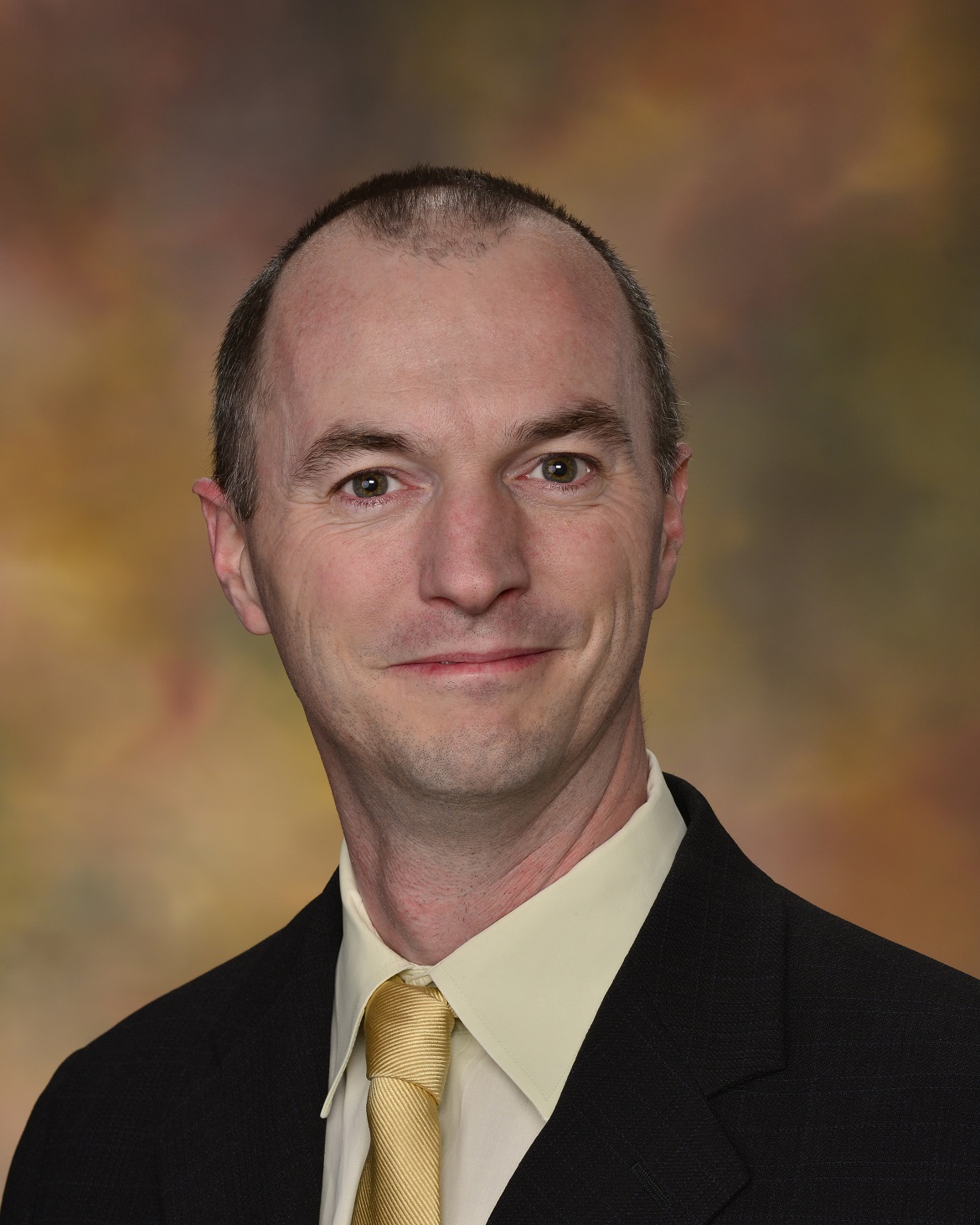
Lorenzo Cremaschi
Categories: Undergraduate Research
Biosystems faculty to train undergraduate researchers in bioprocessing with NSF award
Reduce, reuse, recycle. Especially if you can research cool, new ways to do it.
A team of Auburn faculty recently received a grant from the National Science Foundation to host a research experiences for undergraduates (REU) site, a program in which a university hosts 10 undergraduate students to do scientific research each summer. The project will focus on ways to convert waste into new and useful products through bioprocessing.
Led by Brendan Higgins, assistant professor of biosystems engineering and Sushil Adhikari, Alumni Professor of biosystems engineering and director of the Center for Bioenergy and Bioproducts, the 10-week program will be offered to a selection of students from a pool of undergraduate applicants studying at universities around the nation, who will each be paired to work directly with an Auburn University faculty member.
“The purpose of our site is to train them in research focused on converting waste materials and waste products back into products of value,” Higgins said. “So we have a team of faculty across the university who do research in this area, and we have four projects that the students will engage in.”
The program received $391,099 from NSF, with a focus on giving opportunities to underrepresented students. Students from around the country who go to universities that do not have research programs will have priority when it comes to this program, Higgins said.
“NSF’s goal when they created this program was to maximize the diversity of students that are able to experience research,” Higgins said. “We’re particularly targeting students who might not otherwise have the opportunity to do this.”
Students will do research either in a lab or in the field, depending on what kind of work is necessary for the individual project, Higgins said. Most of the 10-week period will be dedicated to research. A smaller amount of time, however, will be dedicated to professional development.
“The students are going to be learning how to become a researcher,” Higgins said. “Another theme of our site is teamwork. The communication aspect of science is also a big component.”
To do that, students will be encouraged to co-author a paper about their research with their faculty mentor, Higgins said.
“I kind of have this viewpoint that if you didn’t tell someone you did something, you didn’t do it,” Higgins said. “Also, publishing is really part of the scientific process. Telling people what you’ve discovered is really important.”
Some of the projects that the students will be working on include: making sensors for disease detection out of waste biomass, making adhesive out of discarded plant matter and upgrading agricultural waste water into protein. All of these projects will be significant in helping convert waste into useful products, which will help our planet long-term, Higgins said.
“The most impactful outcome we want from an REU site is a change in perception among the students,” Higgins said. “We want to know how the attitudes of our students changed throughout the program, and if they began to see themselves as a researcher during this program. Our hope is that this will reinforce and strengthen the desire in our students to continue their research career.”
The application for this REU site will open in September.
Media Contact: Cassie Montgomery, cmontgomery@auburn.edu, 334.844.3668
BY VIRGINIA SPEIRS
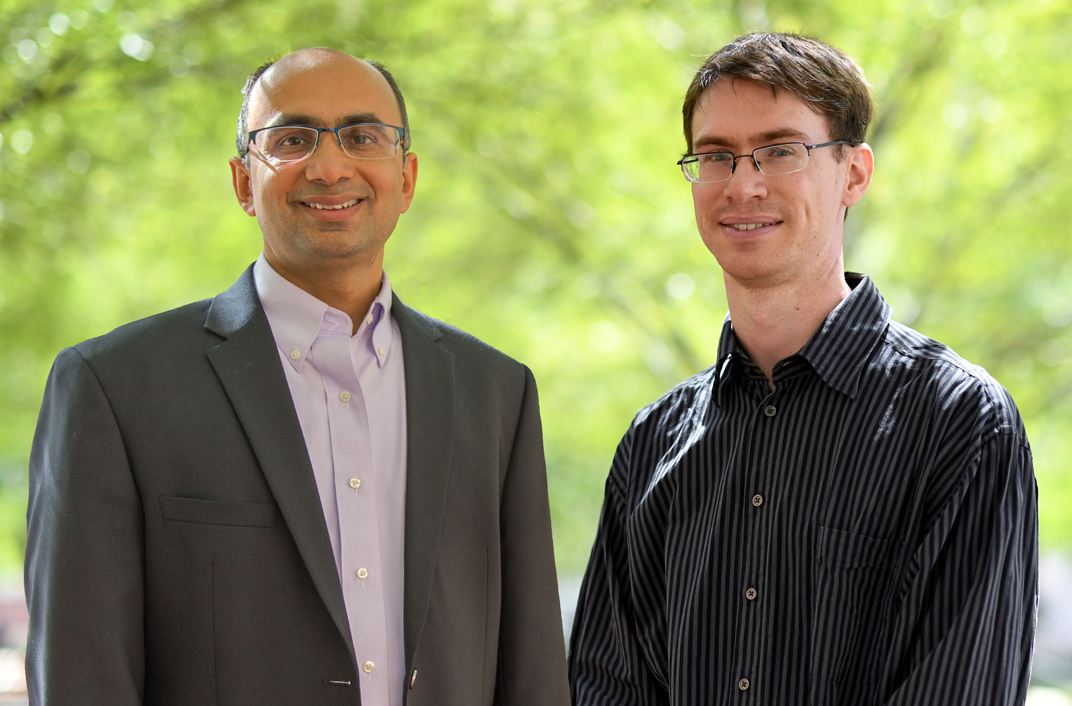
Sushil Adhikari and Brendan Higgins
Categories: Undergraduate Research, Energy & the Environment, Food Systems, Engineering, Agriculture
Auburn University researcher developing management practices for problem algal blooms in aquaculture
Aquaculture is the fastest-growing sector of animal agriculture; however, sustainable expansion and intensification of aquaculture is severely hampered by issues related to aquatic animal health.
A researcher in Auburn University’s School of Fisheries, Aquaculture and Aquatic Sciences is focused on developing programs to help the aquaculture industry better manage problematic algae growth in ponds and other water sources.
Alan Wilson, professor and assistant director for instruction in his school, is partnering with the Aquatic Animal Research Unit of the U.S. Department of Agriculture-Agricultural Research Service, or USDA-ARS, to conduct research involving catfish growers in west Alabama.
“We are currently focused on projects involving 21 ponds across five catfish farms,” Wilson said. “We are monitoring algal growth and gathering environmental data to help those growers establish best management practices for water quality.”
Wilson says algal blooms can be a normal occurrence in ponds with elevated nutrients, but there is an urgent need to manage water quality in aquaculture ponds that favors beneficial algal communities versus those that can be harmful to the fish.
“A ‘green pond’ can be a good thing in the healthy context,” Wilson said. “Algae are important, as they produce oxygen. But blooms can also become too abundant with harmful types of algae, creating conditions that kill the fish. This is what our control focus is on.
“We are developing new detection, prevention and control measures for harmful algae to reduce fish/shellfish mortality, safeguard animal performance and ensure product quality.”
Harmful algal blooms are occurring with increased regularity and severity in freshwater, estuarine and marine systems around the world, according to Wilson. These harmful algal blooms have brought about large-scale catastrophic losses of valuable catfish and shrimp, particularly in the summer months immediately prior to harvest.
In Alabama alone, since 2015, mortality levels attributed to harmful algal blooms have surged to nearly 1 million pounds of catfish annually, according to Wilson’s USDA-ARS collaborator Benjamin Beck.
Moreover, harmful algal blooms are thought to exert profound chronic effects, such as causing the fish to have less-than-normal feeding rates, thereby increasing the time to harvest, along with stress and immunosuppression that can potentially predispose fish to parasitic and bacterial disease.
Wilson conducts his research through his lab at Auburn, which includes a team of four graduate students, five undergraduate students, one high school student and one technician, in collaboration with scientists located at federal and state agencies, nonprofit environmental groups and universities around the world.
“We are starting our second year of this five-year project,” Wilson said. “We collect monthly water samples from each pond that allow us to monitor changes in water conditions with the objective of developing management tools to assist those aquaculture growers in managing their ponds more effectively and efficiently.”
While Wilson’s current USDA-ARS-funded project focuses largely on catfish growers, his lab is broadly interested in understanding the ecology of freshwater lakes, ponds and reservoirs.
“We study the abiotic and biotic mechanisms mediating the promotion or control of freshwater harmful algal blooms and taste-and-odor events in aquaculture ponds, recreational reservoirs and drinking water reservoirs,” Wilson said.
Wilson routinely helps homeowners understand factors associated with harmful algal blooms in their private ponds. He also conducts water quality analyses to determine the threat that algal toxins pose to a variety of aquatic food webs, livestock and zoo animals.
BY MITCH EMMONS
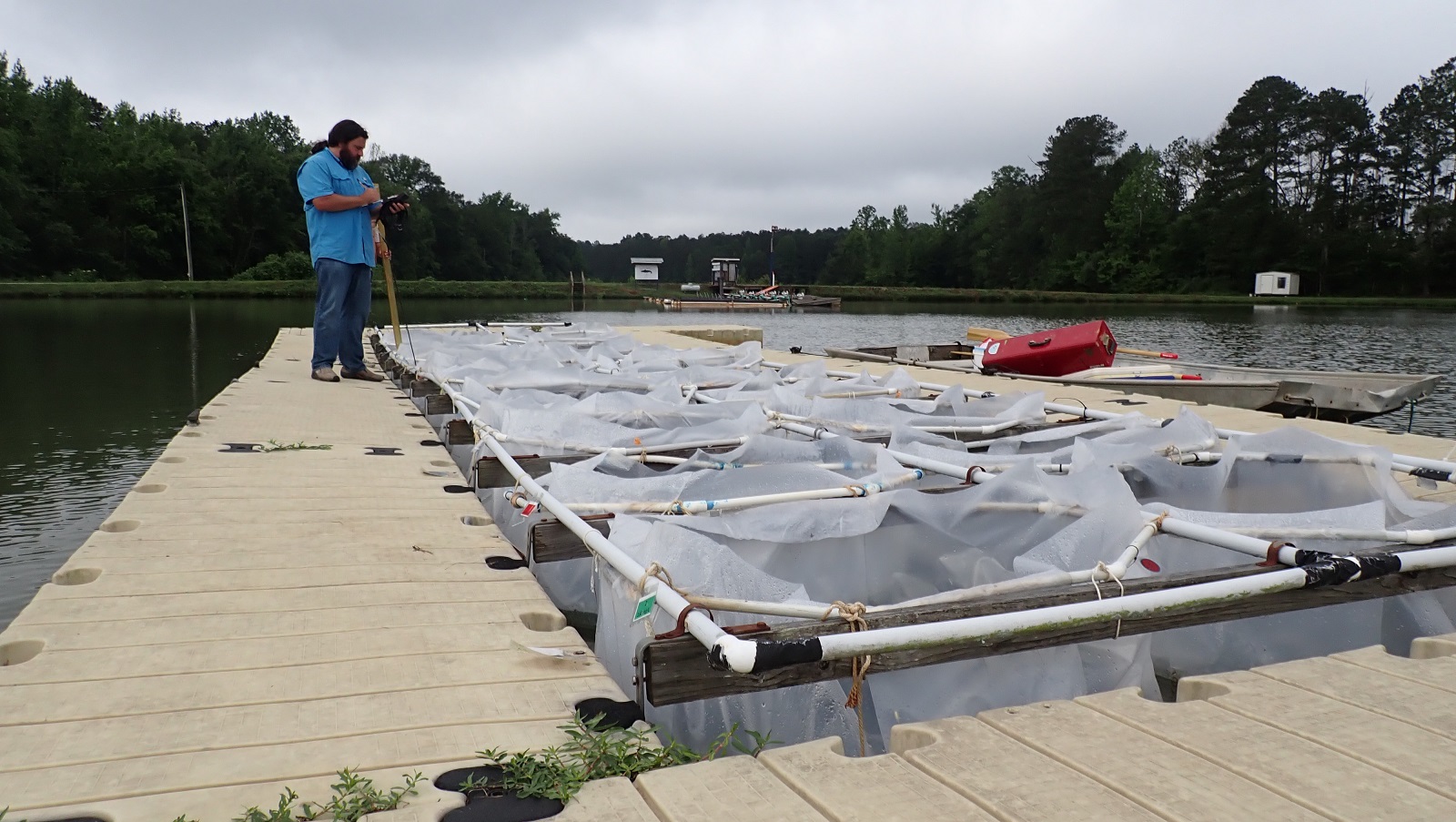
Alan Wilson, professor and assistant director for instruction in Auburn’s School of Fisheries, Aquaculture and Aquatic Sciences, is partnering with the Aquatic Animal Research Unit of the U.S. Department of Agriculture-Agricultural Research Service, or USDA-ARS, to conduct research involving catfish growers in west Alabama.
Categories: Undergraduate Research, Energy & the Environment, Food Systems, Agriculture
Rural Studio making strides, enjoying exciting developments through Front Porch Initiative
Auburn University’s Rural Studio and its Front Porch Initiative have made great contributions to several communities in the Southeast thus far in 2021.
By partnering with affordable housing providers throughout the region, the Front Porch Initiative has been able to support the completion of several houses and the groundbreaking for others since February. All totaled, nine homes are or will soon be under construction through the Rural Studio program, which features homes designed by College of Architecture, Design and Construction, or CADC, students enrolled in the School of Architecture, Planning and Landscape Architecture, or APLA.
These homes are the result of partnerships with housing providers in the Southeast who leverage the applied research and prototype home designs developed through Rural Studio’s ongoing teaching and research with the technical assistance offered by the Front Porch. The initiative leadership includes principal investigator Rusty Smith, associate director of Rural Studio and an APLA faculty member, and co-principal investigators Mackenzie Stagg and Elizabeth Farrell Garcia, assistant research professors.
“In 1993, Rural Studio began by designing and constructing a single home for one family in rural west Alabama,” Smith said. “Acting almost on instinct, we knew then that access to safe and affordable home ownership might be the key to unlocking prosperity in under-resourced communities. Now almost 30 years later, the research is unequivocal: having equitable access to healthy, efficient and durable housing is one of the most powerful social determinants of health. Leveraging this power of home ownership, Rural Studio’s Front Porch Initiative brings together the best housing products, partnerships, practices and policies necessary to provide opportunity and advance equitable outcome throughout the Southeast and in the communities and families that need it most.”
The Front Porch Initiative is a program of Auburn’s Rural Studio, an off-campus design-build program in the School of Architecture, Planning and Landscape Architecture that has been educating citizen architects in Hale County, Alabama, since 1993. The initiative—whose mission is to promote equitable access to affordable, dignified, energy-efficient, resilient and healthy housing—is supported through Rural Studio’s partnership with Fannie Mae.
Front Porch partner Affordable Housing Resources, or AHR, in Nashville was the first collaborator to break ground and complete a collection of four new homes. With estimated mortgage payments of $900 a month, the new homes align with AHR’s mission is to provide affordable housing to Nashville residents.
The Chipola Area Habitat for Humanity, or CAHFH, broke ground on a pair of Rural Studio-designed homes in Jackson County, Florida, on Feb. 25, with two more in the planning stages. Construction of the homes is bolstered through a new partnership with the Building Construction Technology Program at Chipola College that enables students enrolled in the program to earn class credits in exchange for building the CAHFH homes.
On May 7, the Florida project took a big step forward thanks to CAHFH’s Women Build event, which brought out a group of approximately 50 women from the region. Stagg represented Rural Studio on the special day, which saw builders frame the interior and exterior walls of one home, install hurricane straps to another and air seal the home to increase energy efficiency.
“The work with Chipola Area Habitat for Humanity and Chipola College is an exciting collaboration that unites our shared resources in order to increase equitable housing access, facilitate continued disaster recovery efforts and grow a skilled workforce that is prepared to build back better and mitigate damage from potential future weather events,” Stagg said. “It has been a rewarding experience to see how many pieces of the complex housing system have started to come together.”
Certified Community Housing Development Organization Eastern Eight CDC, or E8CDC, is partnering with Front Porch to build a model home to attract more interest from residents of eastern Tennessee to pursue small-unit offerings in the area. The team broke ground on the house on April 8 with representatives from Rural Studio, Appalachia Service Project—a not-for-profit builder providing home repairs and new construction—and E8CDC, which provides a range of housing services to clients in an eight-county service area.
The Front Porch Initiative currently works with organizations in Alabama, Tennessee, Florida and South Carolina. Auburn’s Rural Studio is based in Newbern, Alabama, and has a 15-year history of developing affordable, high-performance rural homes.
BY NEAL REID

Construction progress of Front Porch Initiative homes at Chipola Street Development in Marianna, Florida. (Image by Rural Studio)
Categories: Undergraduate Research, External Engagement, Creative Scholarship
Sixty-three students win awards at ‘Auburn Research: 2021 Student Symposium’
Sixty-three students took home awards for their research and creative scholarship posters and oral presentations during the recent, virtual “Auburn Research: 2021 Student Symposium.” Nearly 350 undergraduate and graduate students from Auburn and Auburn Montgomery participated in the annual symposium, which gives students an opportunity to share their work university-wide and with the general public.
Undergraduate Research Awards
The undergraduate first-place award in the Science, Technology, Engineering and Mathematics poster presentations went to Anna Solomonik of Drug Discovery and Development. Shalom Kim of AUM Chemistry and Biochemistry captured first place in the STEM oral presentations.
In the category for Human Sciences, Social Sciences, Creative Arts, Nursing and Humanities, Sally Ann Missildine of Interior Design won first place for her poster presentation, while Stanley Wijaya of Nutrition, Dietetics and Hospitality Management took first in the oral presentations.
Graduate Research Awards
The graduate first-place winner for the Science, Technology, Engineering and Mathematics poster presentations was Manjusha Annaji of Pharmaceutical Sciences, while first place in the STEM oral presentations went to Kaelyn Fogelman of Fisheries, Aquaculture and Aquatic Sciences.
In the category for Human Sciences, Social Sciences, Creative Arts, Nursing and Humanities, Kassandra Ross of Consumer and Design Sciences won first place in the poster presentations, while Juliana Parma of Kinesiology captured first in the oral presentations.
College-specific awards were also presented for undergraduate and graduate student categories. A complete list of winners, as well as titles of their projects, is available on the “Auburn Research: 2021 Student Symposium” website.
![orange and blue background graphic: Auburn Research: A Showcase of Research and Creative Scholarship Student Symposium 2021 Virtual Event march 29-April 2 [Auburn University logo]](https://cws.auburn.edu/shared/files?id=159&filename=RSRH%20-%202021%20Student%20Research%20Symposium%20Social%20Media%20Graphics_TW.jpg)
Sixty-three students have won awards for their research presentations given during the Auburn Research: Student Symposium 2021 virtual event held March 29 through April 2.
Categories: Undergraduate Research, Health Sciences, Science, Technology, Engineering and Mathematics (STEM), OVPRED, Creative Scholarship, Life Sciences, Agriculture
Eight Auburn students selected to study Alabama matters with fellows from Stanford University’s Hoover Institution
Eight Auburn University students are the first from the Plains to partner with fellows at Stanford University’s Hoover Institution in conducting research and initiatives for the Alabama Innovation Commission.
Allison Foster, Andrew Miller, Jordan Windham and Regan Moss were selected by the leadership of Auburn’s Honors College, while Shivam Patel, Madeline Ellison, Emily Schramek and Daniel “Trey” Sims III were selected by the Cupola Society in the Samuel Ginn College of Engineering.
Gov. Kay Ivey established Alabama’s first statewide commission on entrepreneurship, technology and innovation in July 2020. In December, the Alabama Innovation Commission, or AIC, announced its partnership with the Hoover Institution, a public policy think tank affiliated with Stanford in Palo Alto, California, to promote innovation and economic growth in Alabama.
The Hoover Institution is known for its fellows, leading scholars in areas such as tech innovation, education, business and economic development. The institution is currently under the direction of Condoleezza Rice, an Alabama native, former U.S. Secretary of State and AIC Advisory Council member.
Auburn students will be working—albeit virtually—with Hoover fellows on specific projects, as well as students selected from the University of Alabama at Birmingham, Tuskegee University, Alabama A&M University and Stanford. Projects should take about 10 weeks to complete.
Miller and Ellison will participate in the Business Incentives and Prosperity project, with Josh Rauh, a Hoover senior fellow and the Ormond Family Professor of Finance at Stanford’s Graduate School of Business. This project will evaluate Alabama’s existing incentives for attracting businesses and make recommendations based on the successes and failures of recent incentive programs around the country.
Miller, from Huntsville, Alabama, will graduate May 1 from the College of Liberal Arts with degrees in economics and political science. Besides the Honors College, he is involved in the Auburn Economics Club, Pi Sigma Alpha National Political Science Honor Society, Auburn Tabletop Club and serves as an academic tutor.
“I consider this experience to be a capstone for everything I have learned at Auburn University, requiring me to apply the entirety of what I have studied into practice,” he said. “Working with the fellows will supplement my Auburn education by allowing me to work with and learn from some of the nation’s foremost authorities in economic development.
“As a lifelong resident of Alabama, I am proud to support this initiative, which will aid Alabama’s understanding of the driving forces and incentives behind fostering economic development. I am hopeful that it will lead to greater prosperity for all its citizens.”
Ellison, from Fairhope, Alabama, will also graduate May 1 from the Ginn College of Engineering with a degree in industrial and systems engineering and a business minor. Besides serving as a Cupola ambassador, she is photo editor of the Glomerata and a member of a social sorority and Tau Beta Pi Engineering Honor Society.
“Being able to contribute to this research is an outlet to further cultivate problem solving and critical thinking skills I have developed through my Auburn education,” said Ellison. “Additionally, it is an incredible opportunity for me to give back to a state and university that have done so much for me.”
Moss and Schramek will join Margaret “Macke” Raymond, founder and director of the Center for Research on Education Outcomes at Stanford, in the project, Deploying Broadband-Based Education. The team will look at the current and potential means for deploying broadband-based education throughout the state to augment the current capacities of K-12 educators to deliver high-quality instruction, especially in the priority areas of science, technology, engineering and mathematics, or STEM, which ties in closely to economic development plans for the state.
Moss, who grew up in Arkansas, but moved to Marietta, Georgia, before starting at Auburn, is a junior, studying microbiology and neuroscience in the College of Sciences and Mathematics, or COSAM. Some of her activities include serving as a COSAM undergraduate research ambassador and a research assistant in various labs. She is also a member of Auburn Students Against Human Trafficking, PERIOD. @ Auburn, NICU and Infant Health Unification, the student advisory board for Student Counseling and Psychological Services, Microbiology Club and Neuroscience Club.
“My Auburn education has given me the opportunity to engage with individuals across numerous disciplines with a range of various expertise,” said Moss. “I hope to apply my education effectively, but also know that this experience will ultimately help me to become a more critical thinker, an engaged listener and a stronger advocate for many necessary statewide and local policy changes forefront to the lives of Alabamians.”
Schramek, who grew up in Birmingham, Alabama, will graduate in August from the Ginn College of Engineering with a degree in chemical engineering. She is this year’s executive chair for Cupola and a student worker in the college’s recruiting and scholarship office. She is a member of Omega Chi Epsilon, Tau Beta Pi and a Delta Zeta sorority alumna.
“This experience will allow me to proudly represent Auburn and the education I’ve received the last five years,” said Schramek. “I plan to apply my engineering education to this project to provide a different perspective which will also allow me to broaden my skills within chemical engineering.”
Windham and Sims will join Rauh and Rick Banks, the Jackson Eli Reynolds Professor of Law at Stanford Law School, in the project, Fostering the Role of Universities. This project will aim to make specific, concrete recommendations for state government policy to build on the strength of Alabama’s universities to grow Alabama’s technology and innovation economy.
Windham, from Cullman, Alabama, is a junior, studying political science in the College of Liberal Arts. She is an assistant swim coach with the Opelika Swim Team and founder of Auburn Get Plugged In, a student organization aimed at helping students safely build a community during the COVID-19 pandemic. She was recently awarded an Auburn University Research Fellowship for the fall.
“This internship is an opportunity to apply the skills and knowledge I’ve learned in my classes to actual policy research,” said Windham. “I am so excited to develop the skills to effectively research and advocate for education policies that lift up communities and change lives in Alabama.”
Sims, from Homewood, Alabama, will graduate next year with a degree in mechanical engineering from the Ginn College of Engineering. He is the director of alumni relations for Cupola and president of the Auburn Biomedical Engineering Society.
“I’m looking forward to this position because I’ll get to work with students from other universities in Alabama to help expand the role of universities with innovation in the state,” said Sims.
Foster and Patel will be part of the Outdoor Recreation Lab project with Stephen Haber, the Peter and Helen Bing Senior Fellow at Hoover and the A.A. and Jeanne Welch Milligan Professor at Stanford’s School of Humanities and Sciences. This project will assess the hypothesis that Alabama’s Cumberland Plateau has necessary environmental characteristics to be a draw for high-tech workers and entrepreneurs but is considered an underdeveloped resource for the state.
Foster, from Tampa, Florida, is a junior, studying wildlife ecology and management in the School of Forestry and Wildlife Sciences. Besides the Honors College, she is involved in Kappa Alpha Theta sorority, Wildlife Society and the Forest, Environment and Wildlife Leadership Academy. Foster is also an undergraduate researcher and a lead peer mentor for Supplemental Instruction.
“This will allow me to take the knowledge and skills I’ve already gained from my time at Auburn and use them in a practical way,” she said.
Patel, from Decatur, Alabama, will earn his degree in electrical engineering from the Ginn College of Engineering on May 1. He is a part of the Cupola Society and a member of Phi Sigma Pi National Honors Fraternity. Patel has served as a Camp War Eagle counselor, Student Government Association senator and EMERGE leader.
“This experience will help me give back to the state and allow me to make connections with those that share similar interests in improving the state,” he said. “It will also shed light on what we can do as Auburn graduates to improve the state of Alabama, fulfilling the mission as a land-grant institution.”
BY AMY WEAVER
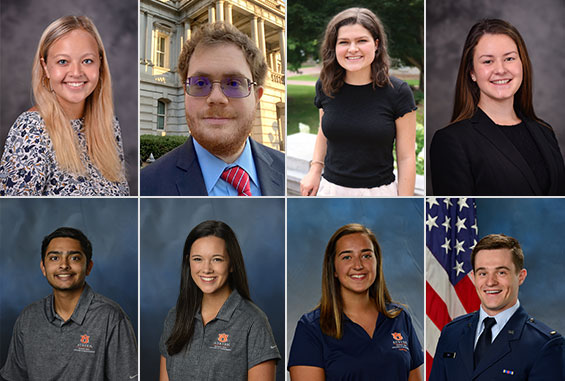
Eight Auburn University students have been selected to partner with fellows from Stanford University’s Hoover Institution in conducting research and initiatives for the Alabama Innovation Commission.
(from left, top row): Allison Foster, Andrew Miller, Regan Moss and Jordan Windham
(from left, bottom row): Shivam Patel, Madeline Ellison, Emily Schramek and Daniel “Trey” Sims III
Categories: Undergraduate Research, Energy & the Environment, External Engagement, Education
Auburn University senior named Barry M. Goldwater Scholar
Auburn University senior Shelby Wales is now a Barry M. Goldwater Scholar, an honor bestowed on only 410 students nationwide this year. The scholarship is widely considered the most prestigious award in the United States for undergraduates in science, technology, engineering and mathematics.
Wales, originally from Sylacauga, Alabama, is majoring in chemical engineering in the Samuel Ginn College of Engineering and minoring in supply chain management in the Raymond J. Harbert College of Business. Wales was chosen from a field of more than 5,000 college students.
Her research investigates different pathways of implementing 3D printing to investigate geochemical reactions. Wales hopes that, by producing 3D printing models of real rock structures that possess the same reactive properties, further insight may be obtained about the geochemical reactions that occur in conjunction with carbon capture and sequestration.
“I think the community of Goldwater Scholars I have already been connected to will be immensely helpful as I continue learning and begin my career,” Wales said. “I am incredibly honored to have been selected for this scholarship, and I hope it will put me in a position to continue doing work I enjoy with incredible people.”
While Wales spends multiple hours in the lab, she also finds time to participate in a variety of campus organizations, as well as win numerous accolades for her academic success. She was awarded the 2020-21 Undergraduate Research Fellowship; is a member of Alpha Omega Epsilon, Omega Chi Epsilon and Tau Beta Pi honors societies; and has made the Samuel Ginn College of Engineering Dean’s List multiple times.
“I feel so fortunate for the support of peers, mentors and family that surround me,” Wales said. “The Goldwater Scholarship is an individual award, but I have not been alone throughout my undergraduate and research experience.”
Wales noted that Assistant Professor Lauren Beckingham in the Department of Civil and Environmental Engineering has supported her research interests and personal academic journey from the time Wales joined Beckingham’s research group in spring 2019.
“The open, collaborative environment fostered in our research group has been formative toward my perception of the value of scientific research,” Wales said.
During Wales’ internship with Southern Company, Nick Irvin, director of research and development, strategy, advanced nuclear and crosscutting technology, and Lauren Lathem, principal research engineer, continuously prompted her to be intentional and objective when conducting research.
“Their guidance has allowed me to think creatively about the way research is conducted, so that the best solution, or the right solution, can be found,” Wales said.
Alex Sauer, fellowship advisor for Auburn’s National Prestigious Scholarships Program and the Goldwater campus representative, said, “The Goldwater Scholarship is the preeminent undergraduate award of its type in the fields of mathematics, the natural sciences and engineering. We look forward to great things from Shelby and commend her faculty mentors for the pivotal role they have played in her success.”
The Barry M. Goldwater Scholarship Program was established to provide scholarships to outstanding students who intend to pursue careers in mathematics, natural sciences and engineering. Each scholarship covers eligible expenses up to a maximum of $7,500 annually for undergraduate tuition, fees, books and housing.
In awarding scholarships, the foundation considers the nominee's field of study and career objectives, along with the extent to which that individual has the commitment and potential to make a significant contribution to the field of science or engineering.
The National Prestigious Scholarship office at Auburn University, located in the Honors College, works closely with students to identify and help them pursue prestigious scholarships and other national and international awards through informational sessions and one-on-one support during the application process. For more information, contact Alex Sauer at ras0046@auburn.edu.
BY WADE BERRY
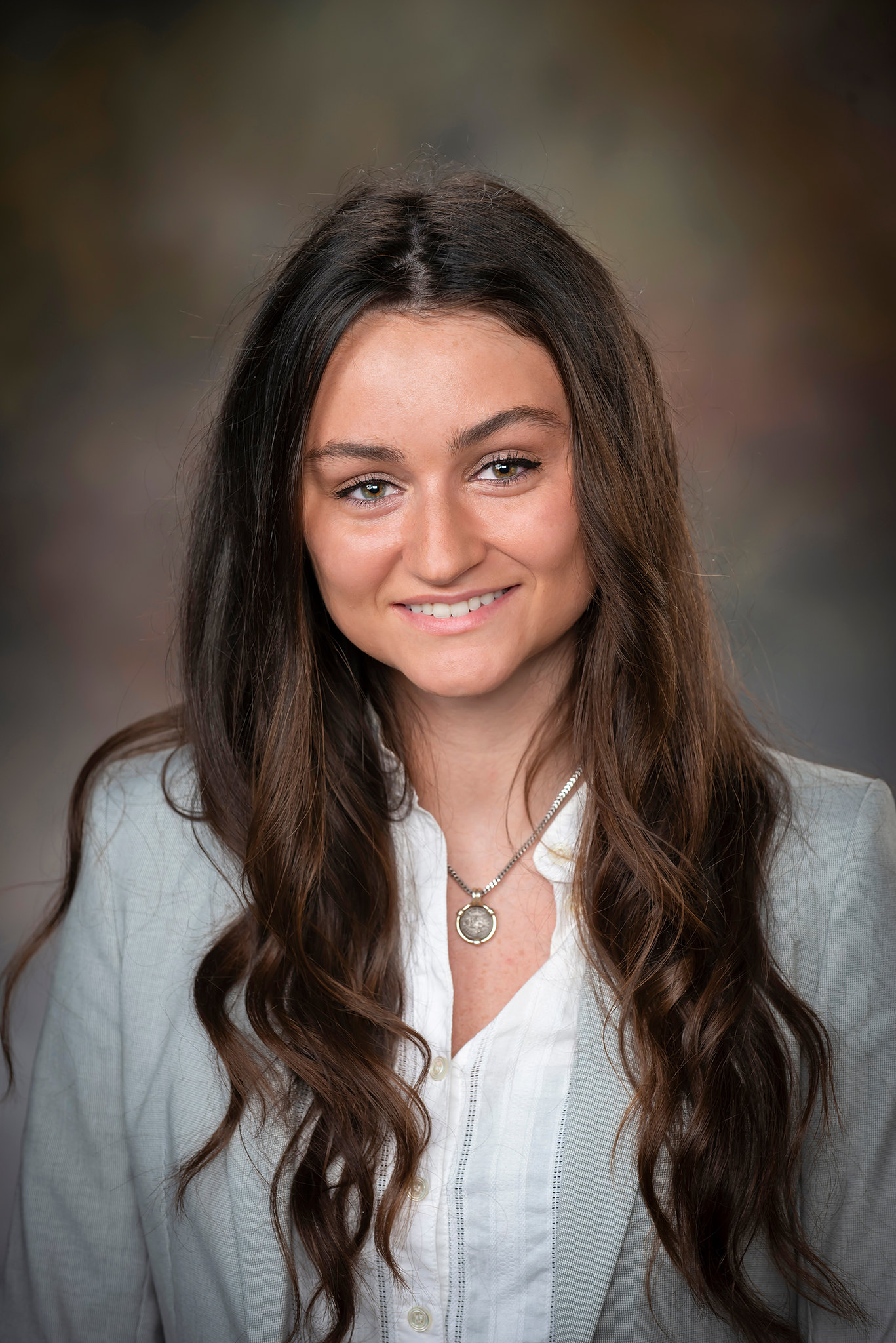
Auburn University senior Shelby Wales is now a Barry M. Goldwater Scholar, an honor bestowed on only 410 students nationwide this year.
Categories: Undergraduate Research, Science, Technology, Engineering and Mathematics (STEM), Engineering, Auburn In the News
Auburn Research: Student Symposium virtual event set for March 29-April 2, offers showcase of student research, creative scholarship
Although the presentation format is virtual, this year’s “Auburn Research: Student Symposium” offers Auburn University and Auburn University Montgomery students a unique venue for showcasing their research and creative scholarship to a broad audience. More than 350 student presentations are expected for the symposium, which runs March 29-April 2.
“Undergraduate and graduate students will be making oral, poster and creative scholarship presentations,” said Lorraine Wolf, director of undergraduate research and organizing member of the Auburn Research Symposia Committee. “Students from all disciplines will participate.”
This year’s event, instead of the typical live presentations, is being conducted virtually. Podium presentations will be delivered live via Zoom, with presenters assigned a specified time. Poster presentations will be prerecorded, but opportunities for feedback and interactions will be provided.
“The student symposium is envisioned as an opportunity to share student discoveries and creative scholarship with a broad audience consisting of faculty, staff, graduate and undergraduate students and the public,” Wolf said. “In addition, students can compete for several awards, with prizes ranging from $50 to $500.”
More information about the event can be found on the Auburn Research: Student Symposium website. Undergraduate students with questions should contact Wolf at undgres@auburn.edu. Graduate students should direct questions to Sara Schiller at sgs0025@auburn.edu.
“Even though we are having to conduct this year’s symposium online, it still offers students a unique opportunity for presenting their work,” Wolf said. “Despite the challenges of the past year, our students are actively involved in cutting-edge research on a broad range of socially, culturally and scientifically relevant topics, and we believe there will be substantial interest, just as in the years previous.”
BY MITCH EMMONS
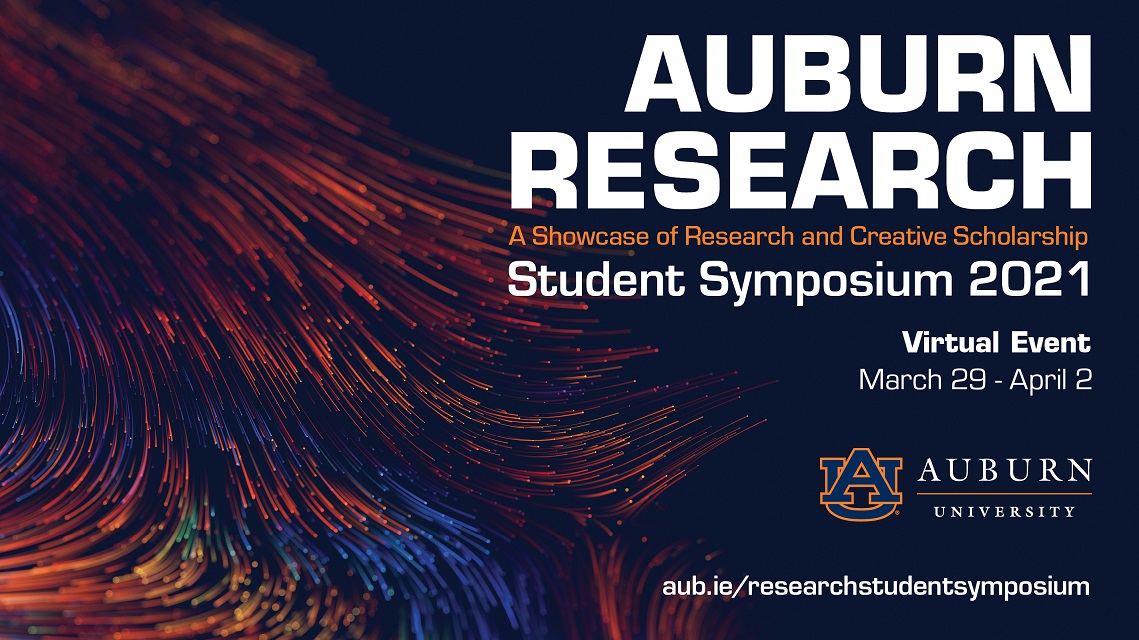 The 2021 Auburn Research: Student Symposium is set for March 29-April 2.
The 2021 Auburn Research: Student Symposium is set for March 29-April 2.
Categories: Undergraduate Research, Science, Technology, Engineering and Mathematics (STEM), Creative Scholarship


